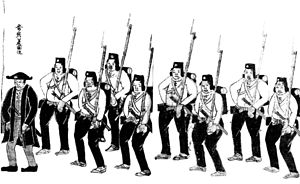Tengutō Rebellion
| Mito rebellion 水戸幕末争乱 |
|||||||
|---|---|---|---|---|---|---|---|
| Part of Bakumatsu conflicts | |||||||
 Shogunate troops moving to quell the Mito rebellion in 1864.  Woodblock print by Utagawa Kuniteru depicting Mito rebels under the "Sonnō Jōi" banner battling the shogunal army in Tsukuba. |
|||||||
|
|||||||
| Belligerents | |||||||
| Eastern Japan Sonnō Jōi Rōnin force |
Tokugawa shogunate Mito Domain |
||||||
| Commanders and leaders | |||||||
| Takeda Kōunsai (武田耕雲斎) | |||||||
| Strength | |||||||
| 2,000 men | About 10,000 men | ||||||
| Casualties and losses | |||||||
| About 1,300 | ? | ||||||
The Mito rebellion (水戸幕末争乱 Mito bakumatsu sōran?), also called the Kantō Insurrection or the Tengutō Rebellion (天狗党の乱 tengutō no ran?), is a civil war that occurred in the area of Mito Domain in Japan between May 1864 and January 1865. It involved an uprising and terrorist actions against the central power of the Shogunate in favour of the sonnō jōi ("Revere the emperor, expel the barbarians") policy.
A shogunal pacification force was sent to the Mount Tsukuba on 17 June 1864, consisting of 700 Mito soldiers led by Ichikawa, with 3 to 5 cannons and at least 200 firearms, as well as a Tokugawa shogunate force of 3,000 men with over 600 firearms and several cannons.
As the conflict escalated, on 10 October 1864 at Nakaminato, the shogunate force of 6,700 was defeated by 2000 insurgents, and several shogunal defeats followed.
The insurgents were weakening, however, dwindling to about 1,000. By December 1864 they faced a new force under Tokugawa Yoshinobu (himself born in Mito) numbering over 10,000, which ultimately forced them to surrender.
The uprising resulted in 1,300 dead on the rebels' side, which suffered vicious repression, including 353 executions and approximately 100 who died in captivity.
...
Wikipedia
